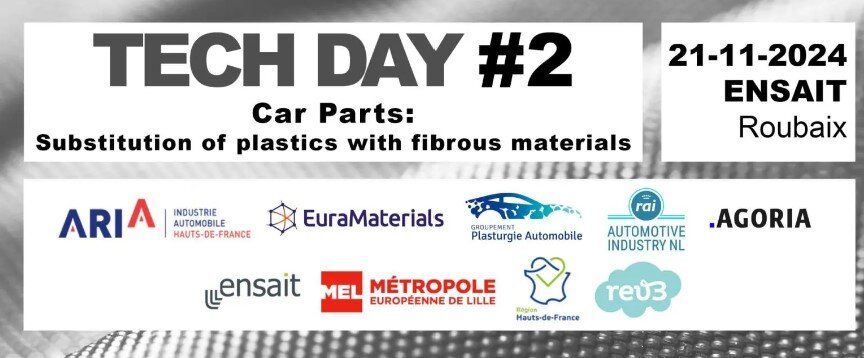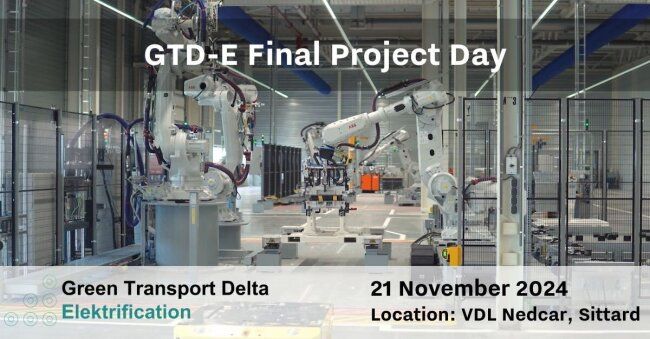Substitution of plastics with fibrous materials
As the automotive industry shifts toward greener alternatives, the challenge of replacing plastics with natural and recycled fibrous materials has never been more crucial.
We are delighted to invite you to our upcoming TechDay #2 on the theme Car Parts: Replacing Plastics with Fibrous Materials, which will take place on November 21, 2024, at ENSAIT, Roubaix, from 09:00 to 16:30 (with registration from 08:30).
This event will bring together manufacturers, technical centers, R&D experts, research laboratories, and anyone with an interest in exploring innovative approaches to sustainable materials in the automotive sector. Our focus will be on natural fibers, recycled fibers, natural composites, eco-design, sustainability, end-of-life solutions, and circular economy for the automotive industry.
Event Highlights
- Presentations (15 minute-pitch/5 minute Q&A session): expert-led presentations with insights on cutting-edge research, technological advances, and practical industrial applications
- Networking lunch with demonstrators: participants are invited to bring demonstrators or prototypes to showcase during the networking lunch, offering an opportunity to exchange ideas and foster collaborations (subject to availability; register your interest using the registration form)
Secure your spot at TechDay and drive the change toward a greener future!
Our speakers:
- PFA: « Fit for 55 and the Automotive Sector: Regulatory Constraints and Environmental Goals for a Sustainable Transition » This presentation will address the regulatory challenges faced by the automotive industry under the « Fit for 55 » initiative, which aims to reduce greenhouse gas emissions by 55% by 2030. Highlighting the theme of the event focused on replacing plastics with natural and/or recycled fiber materials, we will explore how these innovations can assist manufacturers in meeting stringent CO₂ emission standards and energy efficiency requirements. Participants will gain insights into the implications of these regulations and the opportunities for integrating sustainable materials in line with European environmental objectives.
- Trèves: Fibrous materials in automotive applications as a substitute for plastics. The European « Fit for 55 » package has emphasized the need for a disruption in the car industry. Weight saving together with circular economy becomes key to reducing drastically CO2 emissions all along the product life cycle. As a leader in soft trims and acoustics, Treves Group has developed innovative solutions to support the OEMs in their weight reduction targets and their willingness to introduce recycled materials from End-of-life vehicles and post-consumer/industrial wastes. Through the example of underbody parts, we will show how we’ve been able to offer a complete range of fibrous solutions to match the OEM's specs while improving the acoustics of the vehicle.
- Motherson Group: Miscanthus fibers to reinforce automotive molded components components. In purpose to reduce plastic injection carbon footprint, according to the future weather conditions Motherson has developed a polypropylene resin reinforced with miscanthus fibers suitable to make instrument panel substrates, in partnership with one compounder and one OEM
- EcoTechnilin: Natural fibers in the automotive industry, what is, what could be. In today's automotive industry, some reinforcement parts are already made with natural fiber non-woven mats. The manufacturing process creates co-products (30/40 % of the weight of the parts) that today are treated as waste. The case study of the Recytal process by EcoTechnilin will present a manufacturer's agility and ability to propose a new business model: build a circular and virtuous economy circle with its advantages in CO2 emission and better cost-benefit. The case will also highlight the barriers innovation can face in the automotive industry. The perspective will be on the next step – visible natural fibers in vehicles
- Refashion: From textile waste to technical nonwovens for the automotive industry. Car manufacturers have made some undertakings to use more recycled materials in newly designed vehicles. The expected features of products manufactured with these materials are acoustic performance, lightness, and recycled and recyclable content. Refashion launched a collaborative Working Group in 2020 to develop a high-performance insulating nonwoven made from post-consumer clothing collected in France. The Working Group enabled to create a technical nonwoven meeting the requirements of automotive suppliers. The industrial value chain still has to be validated, with the ongoing automatisation of post-consumer textile materials sorting and preprocessing to optimize production costs.
- Région Hauts-de-France x CROSSROADS: Driving Interregional Innovation: Funding Opportunities for Sustainable Mobility. Presentation of ongoing funding opportunities that can fuel your organization’s growth in the green transition! This session explores strategic calls for projects that support sustainable mobility, circular economy practices, and cross-border partnerships. From the « AMI Mobilité » (Sustainable Mobility Innovation Call) by Hauts-de-France region, focusing on green solutions across the automotive, rail, and aerospace sectors, and the Just Transition Fund; to the Interreg CROSSROADS project, an initiative aimed specifically at SMEs, encouraging collaborative research and development for sustainable cross-border innovations; attendees will learn about essential programs that turn environmental challenges into business opportunities.
- CEA: Properties of PLA/natural fibers composites. As part of a European project, the CEA experimented with the idea of replacing polymers of fossil origin (PMMA and ABS-GF) used via 2K injection in car side pillars, with biobased composites such as PLA filled with flax or hemp fibers. The automotive world has specific requirements such as the aesthetic appearance of parts, their thermal resistance, and their mechanical performance, and this talk will address the properties obtained during this project for such composites.
- Centexbel: Biobased resin formulations and sustainable reinforcements to make lightweight composite parts for the automotive sector. This presentation will showcase the Horizon Europe project Suspens results, focusing on developing innovative biobased resin formulations and sustainable textile reinforcements. These materials can produce composite parts for the automotive industry, offering a sustainable alternative to traditional fossil-based composites. By utilizing recycled and bio-sourced materials, the project aims to reduce the environmental footprint of automotive composite parts while maintaining the performance and durability of conventional materials
- Eurostyle Systems: Decorative natural fibers for automotive interior parts. To describe the material NFPP, process, and validations done for automotive interior parts through a prototype tool(press forming with back injection), and describe the benefits in terms of weight and CO2 reduction
- CETI TRANSFORMATIVE TEXTILES: Natural and recycled fibers in automotive: challenges and opportunities. Natural and recycled fibers present significant potential for the automotive sector, offering environmental benefits, weight reduction, and enhanced cabin aesthetics. However, they face challenges such as variability in quality, lower durability under extreme conditions, and compatibility with manufacturing processes. Despite these hurdles, advancements in processing technologies and growing demand for eco-friendly materials drive their adoption. This shift could pave the way toward a more sustainable automotive industry, blending performance with reduced environmental impact.
- ENSAIT: Circular composites made from masks / single-use PPE / linen / recycled textiles for automotive and interior design applications.
Secure your spot at TechDay and drive the change toward a greener future!




